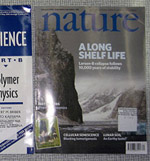Citizen science: recreational divers monitoring marine biodiversity
 Marine,
Marine,  Recreation,
Recreation,  Research,
Research,  Volunteers
Volunteers  Image credit, JLambus.Continuing along our recent theme of citizen science, a new case study in the journal Ecological Applications has looked at the use of recreational scuba divers as part of a large-scale marine biodiversity monitoring effort in the Italian Mediterranean Sea.
Image credit, JLambus.Continuing along our recent theme of citizen science, a new case study in the journal Ecological Applications has looked at the use of recreational scuba divers as part of a large-scale marine biodiversity monitoring effort in the Italian Mediterranean Sea.
Stefano Goffredo and fellow researchers found that a volunteer program involving 3,825 divers with little training was able to conduct broad-based assessments of marine biodiversity with a fairly high level of accuracy.
From 2002-2005, participating divers followed a recreational route and filled out surveys on the presence-absence of 61 marine taxa. The data collected by the volunteers showed that biodiversity remained fairly constant during the study period although several species exhibited declines.
The divers were recruited through tour operators and a popular magazine and received limited training on-site. Goffredo and his team measured the accuracy of the citizen science effort by comparing the surveys of volunteers against those of a trained biologist diving simultaneously.
The researchers found that in 76% of the trials, volunteers performed with an accuracy and consistency of 50-80%, These levels are comparable to the performance of conservation volunteer divers on precise transects in other projects.
These findings are encouraging. Successful conservation work requires much greater levels of data collection and monitoring than paid professionals can reasonably do given the limited resources. The researchers estimate that to replicate their volunteer effort, a single professional would have needed 45 years at a total cost of $4,758,000.
Citizen science programs like the one at the heart of this study could make a big contribution towards addressing this issue. However the question has arisen about whether these citizen science programs can collect data at high enough level of accuracy and reliability. This study and others like it hopefully will address some of these concerns.
The study did identify some limitations, particularly that volunteer divers tended to select for rocky habitat areas leading to an uneven distribution of data. And while the researchers considered the accuracy and consistency levels acceptable, the figures could certainly be better.
However, the study did find that the overall quality of data improved over time, presumably because the trainers got better at working with the volunteers. Furthermore, the researchers note that citizen science programs could make an even bigger contribution than just data collection. They write,
"Citizen involvement as ecological research operators improves scientific literacy and environmental awareness and education amongst all age groups in the community and determines a more sustainable approach to the environment."
--Reviewed by Rob Goldstein
Goffredo, S., Pensa, F., Neri, P., Orlandi, A., Scola Gagliardi, M., Velardi, A., Piccinetti, C., & Zaccanti, F. (2010). UNITE RESEARCH WITH WHAT CITIZENS DO FOR FUN: "RECREATIONAL MONITORING" OF MARINE BIODIVERSITY Ecological Applications DOI: 10.1890/09-1546




Reader Comments